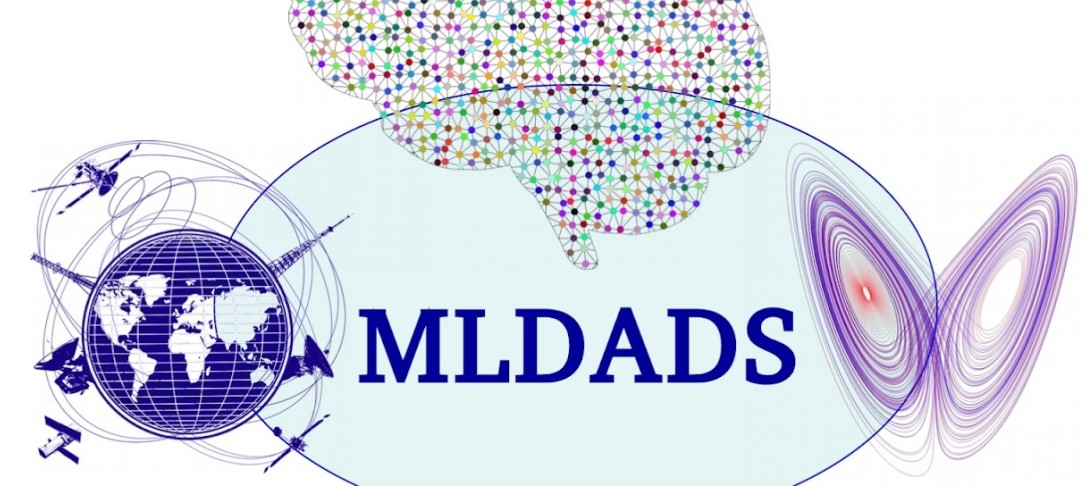
21-23 June 2022
ICCS 2022 : https://www.iccs-meeting.org/iccs2022/thematic-tracks/
… previous editions:
MLDADS 2021: https://www.youtube.com/watch?v=LQSoxz2txZA&list=PLBF13Iq67RMc4QmOSpD-QYrCFNzllyMis
MLDADS 2020 : https://www.youtube.com/watch?v=DZlNe9bfFK0&t=143s
Title: Machine Learning and Data Assimilation for Dynamical Systems – MLDADS 2022
Organisers: Dr. Rossella Arcucci, Prof Yi-Ke Guo
Dr. Cesar Quilodran Casas, Dr. Sibo Cheng and Jake Lever
Important Dates:
-
Paper submission: 18 February 2022
-
Notification to authors: 21 March 2022
-
Camera-ready papers: 11 April 2022
-
Author registration: 21 March – 11 April 2022
-
Non-author registration (in-person): 21 March – 20 May 2022
-
Non-author registration (online): 21 March – 10 June 2022
-
Conference sessions: 21-23 June 2022
Abstract: The object of the theory of dynamical systems addresses the qualitative behaviour of dynamical systems as understood from models. Moreover, models are often not perfect and can be improved using data using tools from the field of Data Assimilation. Additionally, the field of Machine Learning is concerned with algorithms designed to accomplish certain tasks whose performance improve with the input of more data. The intersection of the fields of dynamical systems, data assimilation and machine learning is largely unexplored. The goal of this workshop is to bring together researchers from these fields to fill the gap between these theories.
Call for Papers: The intersection of the fields data assimilation, machine learning and dynamical systems is largely unexplored, and the goal of the MLDADS workshop is to bring together contributions from these fields to fill the gap between these theories in the following directions:
1) Machine Learning for Data Assimilation: how to assist or replace the traditional methods in making forecasts, without the unrealistic assumption (particularly linearity, normality and zero error covariance) of the conventional methods.
2) Machine Learning for Dynamical Systems: how to analyze dynamical systems on the basis of observed data rather than attempt to study them analytically.
3) Data Assimilation for Machine Learning and/or Dynamical Systems: how well does the model under consideration (Machine Learning model and/or Dynamical System) represent the physical phenomena.
4) Data Assimilation and Machine Learning for Dynamical Systems: how can tools from the interaction between the theories of Data Assimilation and Machine Learning be used to improve the accuracy of the prediction of dynamical systems.
Program Committee:
-
Celine Robardet, National Institute of Applied Science in Lyon, France.
-
Roland Potthast, Deutscher Wetterdienst (DWD), Germany.
-
Ionel Michael Navon, Florida State University, Florida US.
-
Marta Chinnici, National Agency for New Technologies, Energy and Sustainable Economic Development, Italy.
-
Andrew M. Moore, University of California Santa Cruz, California US.
-
Nancy Nichols, University of Reading, UK.
-
Livia, Marcellino, University of Naples Parthenope, Italy.
-
Tiziana Di Matteo, Kings College, UK.
-
Gianluca, Bontempi, Université Libre de Bruxelles, Belgium.
-
Massimiliano Pontil, UCL and Istituto Italiano di Tecnologia, UK and Italy.
-
Luca Magri, Cambridge University, UK.
-
Marco Gallieri, NNAISENSE, Switzerland.
-
Vishwas Hebbur Venkata Subba Rao, Argonne National Laboratory, Lemont, IL.
-
Gabriele Santin, Fondazione Bruno Kessler, Italy.
-
Alberto Carrassi, University of Reading, UK.
During submission, you may select either a “Full/Short Paper” or a “Abstract Only” publication. By default, it would be an oral presentation. If you prefer to present a poster, please check the “Poster Presentation” option in the submission page.
While we encourage full paper submissions, the “Abstract Only” option caters to researchers who can only publish in specific journals or work for companies in circumstances such that they cannot publish at all, but still want to present their work and discuss it with their peers at ICCS. In the “Abstract Only” option, a short abstract is published in a book of abstracts, but not in LNCS.
Procedures for Submission:
1) Visit EasyChair Home, if you do not have an account in EasyChair.
2) Prepare the manuscripts (Abstract up to 2 pages, Short Paper up to 7 pages and Full Paper up to 14 pages), written in English and formatted according to the Springer LNCS templates. Templates are available for download in EasyChair horizontal menu “Templates” in the ICCS 2021 submission site in EasyChair.
During submission, you may select either a “Full/Short Paper” or a “Abstract Only” publication. By default, it would be an oral presentation. If you prefer to present a poster, please check the “Poster Presentation” option in the submission page..
3) Submit your paper to the ICCS 2022 submission site in EasyChair
Choose the following track when being prompted for “Select a Track“: Machine Learning and Data Assimilation for Dynamical Systems
For information please contact Dr. Rossella Arcucci, r.arcucci@imperial.ac.uk


